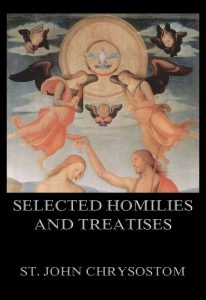Selected Homilies & Treatises – St. John Chrysostrom
This compilation contains the following writings:
Treatise on the Priesthood.
An Exhortation to Theodore After His Fall.
Letter to a Young Widow.
Homilies on S. Ignatius and S. Babylas.
Concerning Lowliness of Mind.
Instructions to Catechumens
Three Homilies Concerning the Power of Demons.
Against Marcionists and Manichaeans.
Homily on the Paralytic Let Down Through the Roof.
Homily Against Publishing the Errors of the Brethren.
On Eutropius, Patrician and Consul.
.. and many more ..
Format: Paperback.
Selected Homilies & Treatises.
ISBN: 9783849673123.
Available at amazon.com and other venues.
Biography of St. John Chrysostom (from wikipedia.com)
John Chrysostom ( c. 349 – 407), Archbishop of Constantinople, was an important Early Church Father. He is known for his preaching and public speaking, his denunciation of abuse of authority by both ecclesiastical and political leaders, the Divine Liturgy of Saint John Chrysostom, and his ascetic sensibilities. The epithet Χρυσόστομος (Chrysostomos, anglicized as Chrysostom) means “golden-mouthed” in Greek and denotes his celebrated eloquence. Chrysostom was among the most prolific authors in the early Christian Church, exceeded only by Augustine of Hippo in the quantity of his surviving writings.
He is honored as a saint in the Eastern Orthodox, Catholic, and Anglican churches, as well as in some others. The Eastern Orthodox, together with the Byzantine Catholics, hold him in special regard as one of the Three Holy Hierarchs (alongside Basil the Great and Gregory of Nazianzus). The feast days of John Chrysostom in the Eastern Orthodox Church are 13 November and 27 January. In the Roman Catholic Church he is recognized as a Doctor of the Church and commemorated on 13 September. Other churches of the Western tradition, including some Anglican provinces and some Lutheran churches, also commemorate him on 13 September. However, certain Lutheran churches and Anglican provinces commemorate him on the traditional Eastern feast day of 27 January. The Coptic Church also recognizes him as a saint (with feast days on 16 Thout and 17 Hathor).
(The text of the last section was taken from a Wikipedia entry and is available under the the Creative Commons Attribution-ShareAlike License.)
Publisher’s Note: This book is printed and distributed by Createspace a DBA of On-Demand Publishing LLC and is typically not available anywhere else than in stores owned and operated by Amazon or Createspace.

